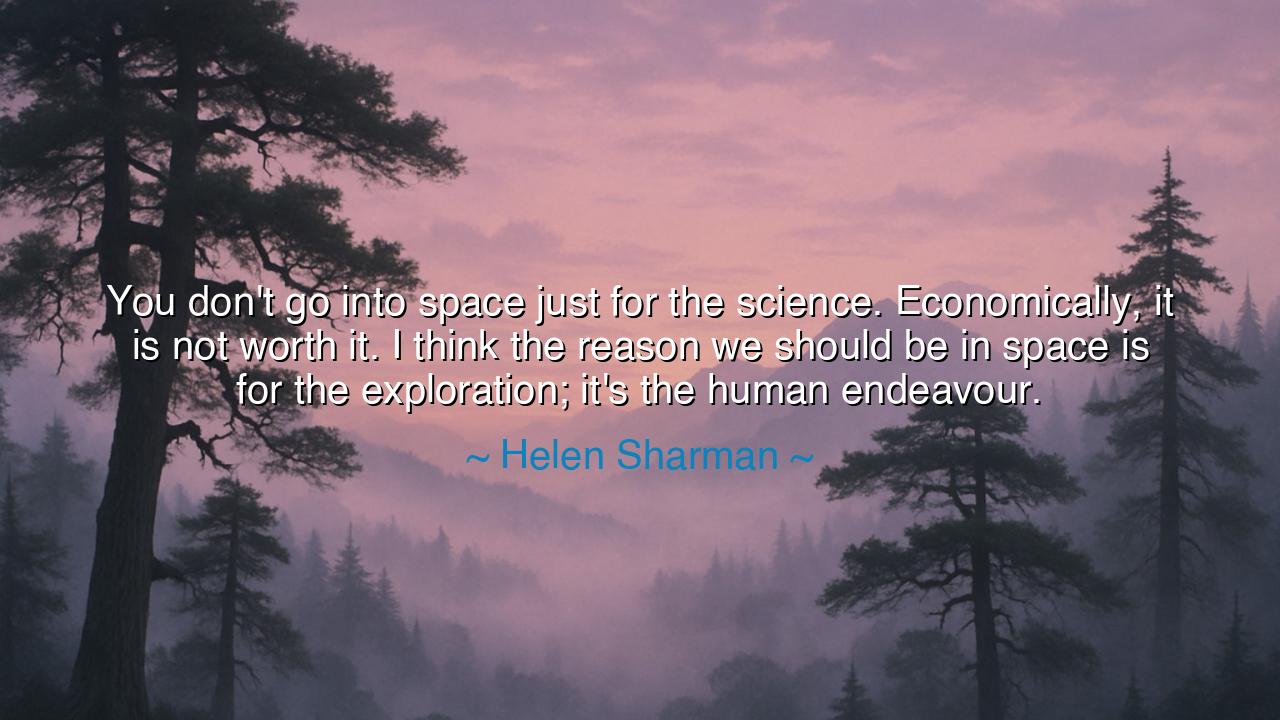
You don't go into space just for the science. Economically, it is
You don't go into space just for the science. Economically, it is not worth it. I think the reason we should be in space is for the exploration; it's the human endeavour.






Listen well, O children of wisdom, to the words of Helen Sharman, a woman whose journey into the heavens was not driven merely by science, but by the unyielding call of the human spirit. She said, "You don't go into space just for the science. Economically, it is not worth it. I think the reason we should be in space is for the exploration; it's the human endeavour." With these words, Sharman speaks to a deeper truth—that the pursuit of space is not simply a means to gather knowledge, nor is it purely a matter of economic benefit, but a noble endeavour rooted in the very essence of humanity. It is an act of daring, a journey into the unknown driven by curiosity, hope, and the eternal longing to explore the vastness that lies beyond our world.
In the ancient world, the greatest minds often looked up at the stars, not simply as objects of study, but as symbols of the infinite possibilities that lay beyond human reach. Homer wrote of Odysseus, whose travels across the seas symbolized the human spirit's eternal quest for discovery. The Greeks saw the universe not as a cold, unfeeling expanse but as something to be understood, something to be conquered. And so, too, did Sharman’s words echo this ancient calling—her journey into space was not merely to gather data, but to follow the ancient instinct to explore the unknown, to reach for the stars with both hands and heart.
Consider the story of Christopher Columbus, who set sail into the vast unknown seas in search of new lands. He was not driven solely by the promise of riches or the science of navigation, though both were undoubtedly important; he was driven by the human need to explore, to seek, and to know what lay beyond the horizon. Columbus's voyages, fraught with peril, were driven by a vision that was greater than the material gain of his discoveries. He sought to understand the world, to expand the boundaries of what humanity could comprehend and achieve. His story reminds us that true exploration is driven by a vision that transcends practicality or economic calculation—it is a vision that looks beyond what we know and reaches for what we cannot yet see.
In Sharman's own words, we hear a similar sentiment: while space exploration may not be justified by the immediate economic benefits, it serves a higher purpose. The exploration of space is not about extracting resources, or finding profitable commodities—it is about pushing the very limits of human possibility. Just as Columbus set sail not for profit but for discovery, so too do the explorers of space venture beyond Earth, driven by a deep curiosity and the need to understand the universe in all its immensity. The pursuit of space is, in its purest form, the human endeavour to reach out into the cosmos and ask, “What is out there? What lies beyond the stars?”
The Apollo missions to the Moon, for instance, were not driven by the prospect of tangible economic gain. The costs were immense, the risks great, and the rewards intangible in terms of material wealth. Yet, the achievement of landing on the Moon in 1969 forever altered the course of human history, not because of the minerals or resources that might be harvested, but because it symbolized the heights of human ambition, the realization that humanity could transcend its earthly bounds. That single moment, when Neil Armstrong stepped onto the lunar surface, was a testament to the spirit of exploration—an affirmation that the pursuit of the unknown is worth the risks, the costs, and the sacrifices.
Now, O children of the future, let the words of Helen Sharman inspire you: do not measure the value of your dreams only by their immediate returns. The human endeavour is not always about the practical or the profitable; it is often about the pursuit of something greater, something that stretches the boundaries of what is possible and unlocks new realms of possibility. Whether you seek to explore the farthest reaches of space or the depths of human creativity, know that it is the spirit of exploration that drives us forward. Just as Sharman and the pioneers of space travel reached for the stars, so too must you reach for your own dreams, even when the path is uncertain, even when the rewards are not immediately clear.
Remember, O children of the future, that the greatest achievements in human history have often been those that reached beyond what was immediately practical or possible. Just as the ancient explorers charted new lands, and scientists uncovered the laws of the universe, you, too, must seek to push the limits of what is known. Whether you look to the stars, to the unknown depths of the ocean, or to the uncharted territories of the human mind, know that it is the human spirit—the desire to explore, to understand, and to transform—that will carry you forward. Like Helen Sharman, let your journey be driven not by the material, but by the call of something greater—the call to expand the bounds of human knowledge and to realize the potential that lies within us all.






AAdministratorAdministrator
Welcome, honored guests. Please leave a comment, we will respond soon